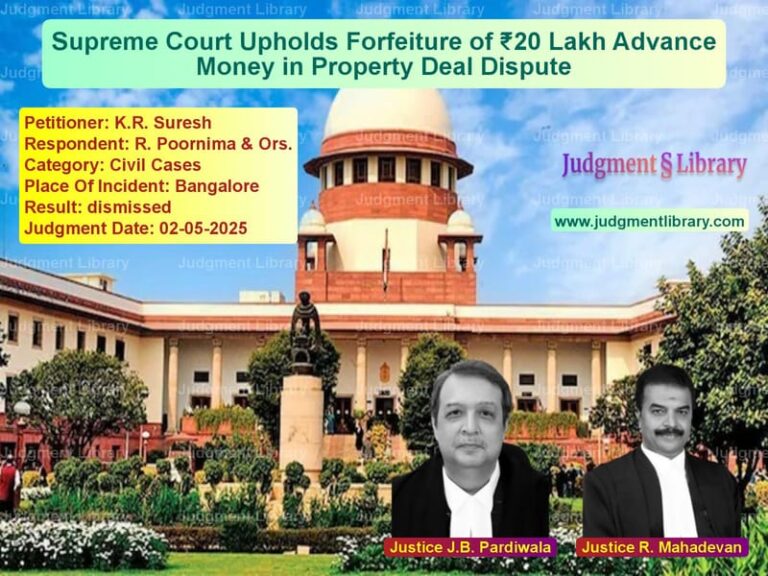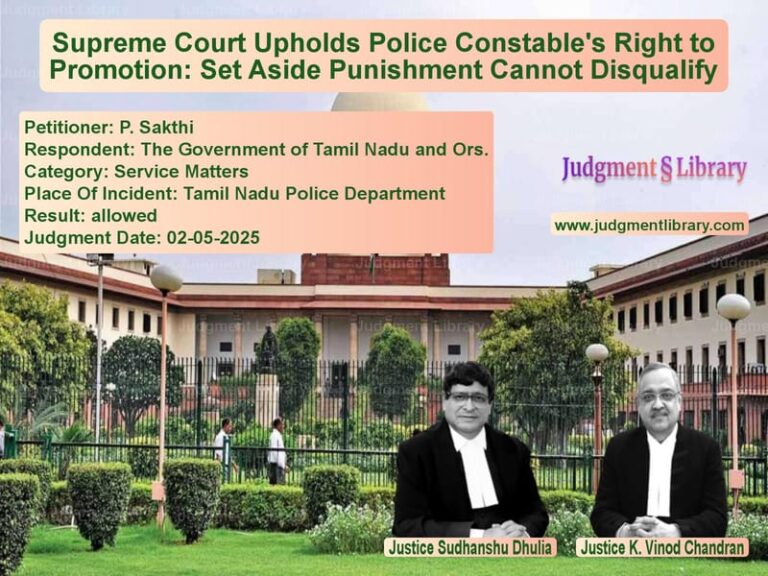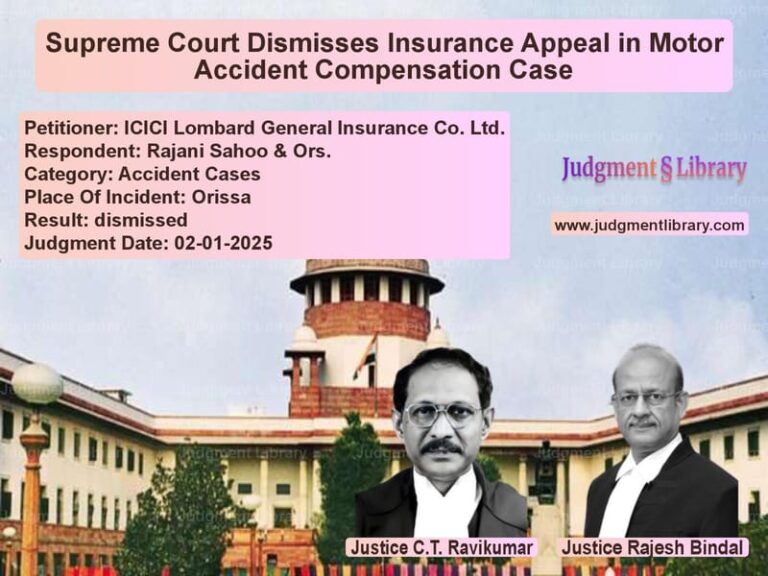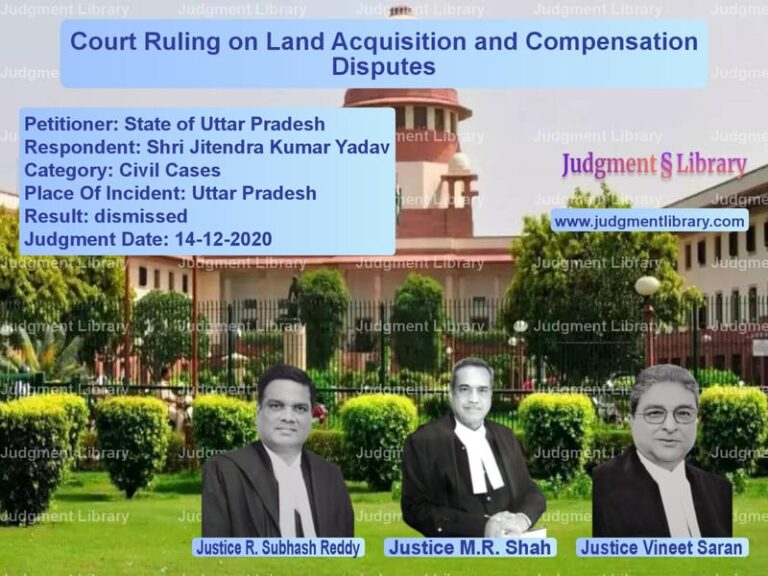Grant of Disability Pension: Supreme Court Ruling in Favor of Retired Army Personnel
The Supreme Court of India, in its judgment dated April 8, 2019, addressed a significant issue concerning the grant of disability pension to an ex-serviceman. The case involved the appellant, Madan Prasad Sinha @ Sanatan Baba, who served in the Indian Army and later developed a chronic medical condition. His claim for disability pension for a specific period was denied, leading him to challenge the decision. The Supreme Court ruled in his favor and directed the authorities to pay him the disability pension with arrears for the period between March 24, 1995, and January 30, 2014.
Background of the Case
The appellant, Madan Prasad Sinha, was enrolled in the Corps of Signals of the Indian Army as a Radio Mechanic on February 18, 1971. He participated in Operation Cactus Lilly in 1971. However, he later developed a chronic duodenal ulcer and was discharged from military service on August 18, 1981, under Army Rule 13(3), as he was placed in a low medical category.
Tribunal’s Decision on War Injury Pension
Following his discharge, the appellant moved the Armed Forces Tribunal (AFT) seeking a war injury pension. The Tribunal, however, rejected his claim, stating:
“The nature of the disability was not attributable to any such participation in action. The grant of war injury pension is applicable only to those who suffer disability due to direct involvement in operations or active line of duty.”
While dismissing his plea for a war injury pension, the Tribunal did not address his claim for disability pension for the period between 1996 and 2014.
Supreme Court’s Consideration of the Disability Pension Claim
The Supreme Court took up the case and, on November 26, 2018, passed an interim order noting the appellant’s submission:
“The submission which has been urged on behalf of the petitioner is that his claim for the grant of disability pension for the period between 1996 and 2014 has not been considered since it was in 2014 that he was granted the disability pension for the period thereafter.”
Accordingly, the Court issued notice confined to this issue and sought a response from the respondents.
Respondent’s Arguments
The respondents (Union of India & Others) filed a counter affidavit, submitting a detailed chart that recorded the appellant’s medical assessments:
- Initially, his disability was assessed at 40% for two years starting from July 14, 1985.
- Subsequently, it was reduced to 20% for two years from July 17, 1987.
- Later, it was increased to 30% for five years from July 17, 1990.
- On March 23, 1994, it was again reassessed at 20% for ten years.
- However, on May 8, 1995, the Principal Controller of Defence Accounts (PCDA), Allahabad, re-evaluated the disability and determined it to be less than 20%, leading to the discontinuation of disability pension from March 24, 1995.
- On January 30, 2014, the Military Hospital, Danapur Cantt., reassessed the appellant’s disability as 20% on a permanent basis for life.
Supreme Court’s Key Observations
The Supreme Court noted that the denial of disability pension to the appellant between March 24, 1995, and January 30, 2014, was erroneous. The Court remarked:
“In this background, we are of the view that the denial of disability pension to the appellant for the period between 24 March 1995 and 30 January 2014 was misconceived.”
The Court emphasized that the appellant’s disability had been reassessed at 20% in 2014 and was considered for life. Therefore, it was unjustified to deny him disability pension for the intervening period.
Final Judgment
The Supreme Court allowed the appeal and ruled in favor of the appellant, stating:
“The appellant shall be granted arrears on account of disability pension in accordance with the applicable rates prevalent at the relevant time between 24 March 1995 and 30 January 2014. The computation shall be carried out, and arrears shall be paid over to the appellant within a period of three months from the date of receipt of this order.”
Significance of the Judgment
The ruling reaffirmed several important principles concerning disability pension for ex-servicemen:
- Entitlement to Disability Pension: If a medical board determines a disability at 20% or more, the individual is entitled to disability pension.
- Consistency in Medical Assessment: The Court underscored that once a disability is acknowledged at a certain percentage, pension entitlement should be maintained consistently unless justified by medical evidence.
- Accountability of Military Authorities: The judgment held that the authorities must follow a fair and consistent approach while granting disability pension, preventing arbitrary discontinuation.
Impact on Other Ex-Servicemen
This ruling serves as an important precedent for other ex-servicemen facing similar issues with disability pension. It provides clarity that:
- Disability pension cannot be arbitrarily discontinued based on fluctuating assessments.
- Once a permanent disability is established, pension must be granted consistently.
- Authorities must adhere to legal and medical guidelines while processing claims.
Conclusion
The Supreme Court’s decision in Madan Prasad Sinha @ Sanatan Baba vs. Union of India & Ors. is a landmark ruling ensuring justice for disabled ex-servicemen. By directing the government to grant disability pension with arrears, the Court upheld the rights of military personnel who have suffered service-related disabilities. This judgment will benefit many veterans facing similar denials of their rightful pension benefits.
Petitioner Name: Madan Prasad Sinha @ Sanatan Baba.Respondent Name: Union of India & Ors..Judgment By: Justice Dhananjaya Y. Chandrachud, Justice Hemant Gupta.Place Of Incident: India.Judgment Date: 08-04-2019.
Don’t miss out on the full details! Download the complete judgment in PDF format below and gain valuable insights instantly!
Download Judgment: Madan Prasad Sinha @ vs Union of India & Ors Supreme Court of India Judgment Dated 08-04-2019.pdf
Direct Downlaod Judgment: Direct downlaod this Judgment
See all petitions in Pension and Gratuity
See all petitions in Public Sector Employees
See all petitions in Disciplinary Proceedings
See all petitions in Judgment by Dhananjaya Y Chandrachud
See all petitions in Judgment by Hemant Gupta
See all petitions in allowed
See all petitions in supreme court of India judgments April 2019
See all petitions in 2019 judgments
See all posts in Service Matters Category
See all allowed petitions in Service Matters Category
See all Dismissed petitions in Service Matters Category
See all partially allowed petitions in Service Matters Category







